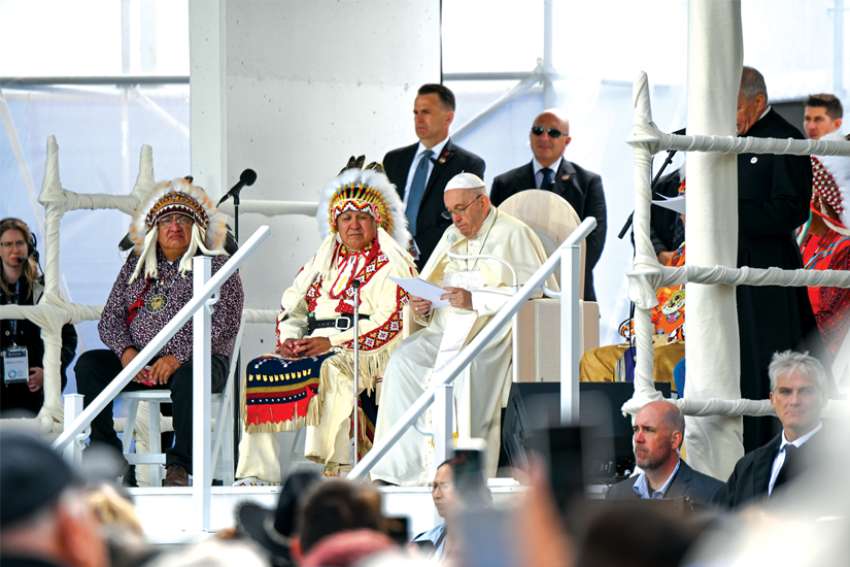Has reconciliation occurred? Well, much more needs to be done. The sooner it starts, the better. Reconciliation may well take seven generations, but we should not slough off further action and return to normal. Without going into the details, “normal” for Indigenous people in Canada has not been good.
So there is Call to Action 59: “We call upon Church parties to the Settlement Agreement to develop ongoing education strategies to ensure that their respective congregations learn about their Church’s role in colonization, the history and legacy of residential schools, and why apologies to former residential school students, their families and communities were necessary.”
The papal visit involved hundreds, thousands of volunteers for the events in the Edmonton region, Quebec City and Iqaluit. People likely had a variety of reasons for volunteering. But the ones I spoke with at the Edmonton Mass had a concern for building lasting reconciliation. That energy cannot be allowed to slip away.
There is a need for leadership to channel that energy. Whether it comes from the Canadian bishops, the Catholic Women’s League, the Knights of Columbus or all these sources, doesn’t much matter. It just needs to happen. And soon.
The call for ongoing education strategies is essential. We need to know the story behind colonization, the churches’ involvement in residential schools and how the schools affected students and their families.
We need to know the basics of the Indian Act and the treaties. Maybe people have bad memories of studying history in school, and they don’t want to learn more history now. But for the sake of a future of justice and equality in Canada, we need to do it.
I realize this sounds demanding. Demands sometimes have the exact opposite effect of what is intended. The civil rights movement in the United States led to many policies intended to combat racism. Two of those policies were integrating public schools through busing and affirmative action. Those policies helped many Black Americans gain a better place in society. They also led to considerable resentment among whites.
Laws and policies will do that. So, whatever education takes place needs to be supplemented by events which bring Indigenous and non-Indigenous, and their descendants, to meet informally in one place. Potluck suppers, discussion groups and even guest speakers from local reserves, Metis settlements and Indigenous organizations can help break the ice. We should listen and become friends.
For several years, the Archdiocese of Regina has been working to develop relations with Indigenous people at the diocesan and parish levels. Events have included potlucks, sharing circles, Christmas parties and gatherings with grandmothers.
The archdiocese offers a model of how to begin.
During his Canadian visit, Pope Francis did not give us a practical plan of action. What he did was call the Church in Canada to conversion. “We need to return to Galilee,” he said at a Vespers service in Notre Dame Basilica in Quebec City. That is, the Church and Catholic believers need to regain the simplicity and enthusiasm of the early Church. She must be a welcoming community that embodies love without borders.
She should not create plans without reference to God, the Pope said, for that would be idolatry. Jesus must be at the centre of all our pastoral activities, he said in another talk.
At Lac Ste. Anne, Alta., he called for a revolution of love. We need healing from our attempts to defend the institution and from preferring worldly power to the Gospel.
After examining the history and pain of native peoples, we must ask, “What do I do for Indigenous peoples? … Do I pray, meet, read, support them, and let myself be touched by their stories?”
These are questions we must ask ourselves. But we should not be asking them alone. Leaders are needed to help us advance together in the ministry of reconciliation.
(Glen Argan writes his online column Epiphany at https://glenargan.substack.com.)


